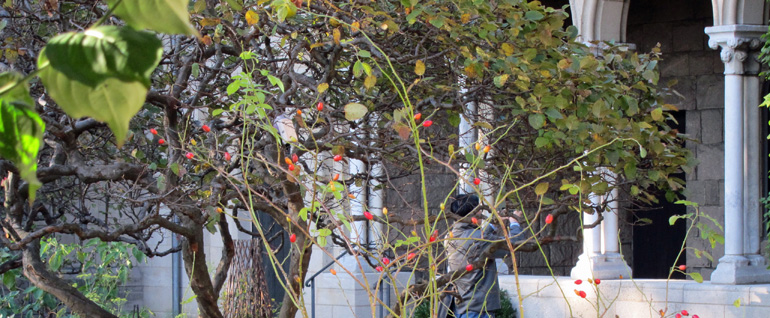Daily Office
Grand Hours
Saturday, 8 January 2011
Sunday, January 9th, 2011

¶ We doubt that any report of Saturday’s grim attack on a Congresswoman and her constituents will resonate more deeply that that of Sheriff Clarence Dupnik. (via Joe.My.God) Sheriff Dupnik is not the best-spoken of men, but he brings, with rare authority, a warm heart to his office, and we think that he is a great American. It is not necessary to follow the press conference after the sheriff begins to be peppered with trivial, sound-bitey questions from the press corps. (Have they no sense of decency?) ¶ Michael Tomasky argues that Sarah Palin has been “diminished” by the shootings; we wish that we didn’t find her so phoenix-like. We do concur, however, with the note upon which Mr Tomasky’s piece ends: “Today’s Republicans and conservative commentators, however, surely understand the fire they’re playing with. But they do it, and a tragedy like Saturday’s won’t stop them, as long as they can maintain a phoney plausible deniability and as long as hate continues to pay dividends at the ballot box.” (Guardian; via Mnémoglyphes)
¶ We wholly support Zawi Hawass‘s demand that the obelisk in Central Park that’s known as Cleopatra’s Needle be returned to Egypt. The secretary-general of Egypt’s ministry of antique loot and treasure is right to claim the obligation to protect such monuments, wherever they may be, and if New Yorkers are not going to shield the granite sculpture from the distinctly non-Nilotic weather obtaining on the Northeast Seaboard, then we ought to send it back to where it came from. Ditto for London’s. (Yahoo News; via Arts Journal). ¶ James Franco has filmed an episode from Blood Meridian, in an attempt, apparently successful, to obtain the rights to adapt Cormac McCarthy’s novel for the screen. This gives new meaning to the term “screen test.” (Entertainment Weekly; via Arts Journal)
¶ While we were holidaying, Richard Crary published a fine piece on the Dunbar number, which is “a theoretical cognitive limit to the number of people with whom one can maintain stable social relationships,” and which Dunbar sets, provisionally, at 150. We came across this number a few years ago in a description of a manufacturing firm that builds a new plant whenever the number of workers at an existing one swells above 150. Of course we can’t remember where we read this, so Richard’s piece comes as something of a godsend. We call for an economic theory that takes the Dunbar number fully into account. ¶ In one of his characteristically brilliant summaries, Felix Salmon touched last week upon the Dunbar number in two distant contexts, US homebuyers with less than stellar credit histories and Bangladeshi microborrowers. In both cases, debts are far more likely to be discharged when a community relationship (paralleling, not replacing, the financial relationship) exists between debtors and creditors. This is hardly surprising to anyone with an ounce of common sense — but that’s the very deficit that we’ve come to expect in eonomists.
¶ Whenever we read that “Dear ” is an inappropriately intimate way to begin a letter (or an email) addressed to unloved-ones, we’re reminded of our adolescent grousing about the insincerity of non-heartfelt thank-you notes. But we can understand that men whose introduction to functional literacy was digitally midwifed might regard the salutation as “girlie.” (Dionne Searcy in WSJ; via Arts Journal). ¶ How to make a pot of tea — Christopher Hitchens gets it wrong: boiling water is too hot for the subtle flavors of Earl Grey and the like. Of course the tea leaves go into the pot before the hot water, but pre-warming is counterproductive: a cool pot cools the water down a bit. Mr Hitchens doesn’t mention steeping times; does this mean (horror!) that he drinks from the brewing pot? Despite the occasional gleam of polished prose, Christopher Hitchens is all guy. (Slate; via MetaFilter and Scocca)
¶ No site that we’re aware of honors the sweet silliness of youth better than The Bygone Bureau. Three recent pieces have made us laugh very wistfully, because they magically restore the lost perspective of the twentysomething worldview. First, Darryl Campbell commemorates the third pair of shoes that he has worn in his adult life; after five years’ service, they can no longer be worn. We are not told what becomes of them, but dumpsterization is difficult to imagine: “I’m still fairly certain that sand from the Kuwaiti desert and dirt from the Louisiana bayou are commingling in a wrinkle somewhere.” It’s when your next pair of shoes collects similarly evocative detritus that your perspective shifts, and, hopefully before the age of sixty, you get rid of them. Hallie Bateman’s “Sex For Idiots” makes up in brio what it lacks in plausibility. We loved her response to learning about the birds and the bees from mom: “I only remember coming to consciousness later, with water all over my eyes and face, with my fingers jammed really deep in my ears. I guess I was trying to hold in all that sexy, dirty knowledge in order to write this column!”
Best of all, David Tveite describes the first thrilling intimations of mortality that transmute vague abdominal rumblings and mild muscle spasms into terminal cancer — confirmation of which, by a licensed physician, must at all costs be avoided. It’s so much easier (and cheaper and sweeter) to imagine one’s impending demise, planning one’s funeral &c — few narcissistic exercises are more anodyne.
Honestly, I can see the appeal of being dead. It’s one thing that’s impossible to do wrong; it happens and then nobody expects anything of you. And people will say wonderful, nice things about you that they never would have said while you were still alive. And the younger you die, the less you have to do for it to be considered a tragedy. Death is easy. Life is hard.
I know that this is all pretty morbid, but before my family starts planning an intervention I think I should say that I doubt I’d ever seriously consider suicide. But if I did, I know that it wouldn’t be for a good reason. If anything really bad ever happened to me, I’d be too shattered to get out of bed, let alone buy a rope and write a note and whatever else I’d have to do. Even now I’m getting exhausted just thinking about it.
But this morning, I got out of bed and went into the kitchen to get some breakfast and I realized that I didn’t have any food in the house. And I really didn’t want to walk the three blocks to the grocery store. And for just a moment, I was like, “That’s it. Today’s the day.â€
Then it passed, and I went grocery shopping.
¶ All about the Republic of San Marino, a mountain fastness famous for its postage stamps. (Hey, it’s a living.) One reason for the republic’s persistence: there doesn’t seem to be much in the way of local attractions. (MetaFilter) ¶ Mention of San Marino always reminds us of Andorra, which lies on the Pyrenean border of France and Spain. Way back when, sovereignty was held by the Bishop of Urgel, a neighboring potentate; in 1095, the bishop turned to the Lord of Caboet, on the French side, for military protection from the Count of Urgel, an even greater potentate. The bishop of Urgel and the French aristocrat made a deal to rule Andorra jointly. It’s a measure of the great differences in French and Spanish national development that the Bishop of Urgel is still co-ruler; the Lord of Caboet’s title has devovled upon the shoulders of the President of France. (BBC News; Wikipedia)
¶ We’re in the middle of All a Novelist Needs, a collection of pieces by Colm TóibÃn on the subject of Henry James, and we read Gabriel Josipovici’s review, in the Irish Times, with the greatest interest (via 3 Quarks Daily). We’re very much inclined to agree with the review in its one dispute with both TóibÃn and James:
I do, however, have to take issue with TóibÃn and with James himself on one important point. In an essay on the meaning for the novelist of Lamb House, his Sussex retreat in his later years, TóibÃn quotes a letter James wrote to his friend Grace Norton about the heroine of A Portrait of a Lady and her relationship to the real-life Minnie Temple: “I had her in mind and there is in the heroine a considerable infusion of my impression of her remarkable nature. But the thing is not a portrait. Poor Minny was essentially incomplete and I have attempted to make my young woman more rounded, more finished. In truth everyone, in life, is incomplete, and it is [in] the work of art that in reproducing them one feels the desire to fill them out, to justify them, as it were.â€
TóibÃn is so taken with this formulation that he repeats it verbatim in one later essay and paraphrases it in another. But what artists say about their work, even artists as self-aware as James, is, as TóibÃn knows all too well, not necessarily the truth. It seems to me that both James and TóibÃn in The Master are using their art not to round out and fill out a portrait left incomplete by life, which sounds more like the sort of aim Oscar Wilde might have expressed, but to bring home (to themselves, to the reader) the mystery of that life. That is why each of the great last novels ends not with resolution, not with final understanding, but with the sense that something which could be said in no other way has, remarkably, been said by the accumulation of things not said, of actions not done. That is why James’s greatest short story, The Turn of the Screw , ends so magnificently and so mysteriously: “I caught him, yes, I held him – it may be imagined with what a passion; but at the end of a minute I began to feel what it was truly that I held. We were alone with the quiet day, and his little heart, dispossessed, had stopped.â€
¶ Dwight Garner on Annie Proulx: “Reading Ms. Proulx’s prose is like bouncing along rutted country roads in a pickup truck with no shock absorbers.” Couldn’t agree more. (NYT)
¶ At Brainiac, Josh Rothman writes about a new collection of essays, The Offensive Internet, that argues for equal protection in the digital sphere — in other words, equal enforcement of free-speech restrictions that hold in the bricks-and-mortar world. “The Internet has grown up – and it should be subject to grown-up laws.”
¶ SS Streets of Monaco (Superyacht Design; via Things)
¶ The Baroque Inevitable — an LP that the Editor bought new, in 1966. Can it really have been reissued on CD? We shall see! (The Rumpus)
¶ We have ALWAYS wanted to attend a concert at Wigmore Hall. (Guardian; via Arts Journal)





